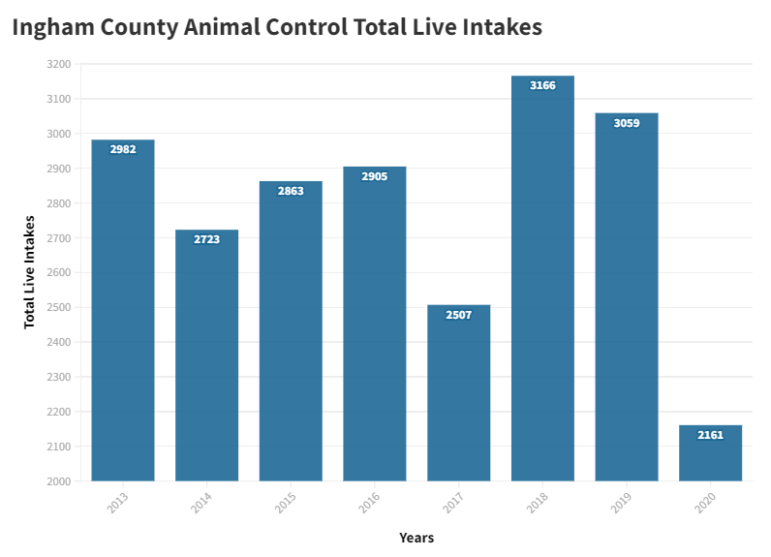Belinda Fitzpatrick, licensed attorney and MSU graduate looks lovingly into a picture of her chicken, Tap, while remembering the times they had together.
“I’ve been in treatment for anxiety and depression for about 10 years. And the chickens were something to help me. Because the thing is, my diabetic condition is so bad that I’m not able to work because I’m not able to meet the expectations of an employer. I just wanted to take care of the chickens and they made me feel better,” said Fitzpatrick.
Animal control is a necessity with issues on both side.

Flourish- Jaclyn Sellentine
The total live intakes of animals for the Ingham county animal control/shelter. This graph shows the data throughout the years.“We have a dispatcher staff and if anyone has concerns about the welfare of animals in the community, they can call our dispatch and report anonymously, or not anonymously. In addition to the dispatch call center, we have an email where people can email their concerns as well. That’s all handled by our dispatchers,” said Julie Hill, community outreach manager for Ingham County Animal Shelter.
Fitzpatrick had her 27 chickens taken away by animal control about six months ago. She is facing possible jail time for up to seven years.
“They don’t understand how I live or why I live the way that I live. Because all of those chickens were healthy. Now, some of them were in the house, the large ones were outside,” said Fitzpatrick.
“Livestock has completely different (living) standards than domestic animals,” said Kyle Hanney, animal control sergeant. “Their standards are going to be a lot lower. When it comes to livestock they can actually use the natural topography.”
According to Hanney, in order to check out a house the animal control officers try to get cooperation and consent, but sometimes do need to establish probable cause to get a search warrant.
Fitzpatrick said, “The animal control guy told me my house could be condemned because the front yard wasn’t mowed and it’s naturalized. And then outback he said there were these metal things with overgrown bushes, those were my tomato plants.”.
Fitzpatrick’s house was red tagged.
Hanney said, “red tag is a general term that we use, but it means the house is condemned by the city and township where it’s deemed unsafe for all inhabitants, including animals and people,” said Hanney. “But a lot of it depends on sanitary conditions. When we’re looking for sanity conditions, we are looking for them to be free from crowding conditions, hoarding houses, and free from waste. But generally when houses are red tagged or condemned that’s going to be the worst of the worst situation because at that point it’s even unsafe for humans to live in.”
According to Hanney, when it comes to outdoor animals, they have to be able to remove themselves from their own waste.
When animals are extracted from a home that’s been deemed unfit, they are transported to the animal shelter and vaccinated. Then a vet does a cruelty exam and, depending on the situation, it can be used in a criminal investigation, according to Hanney.
Fitzpatrick said her health declined after she lost her chickens. “They took them on Sept. 21. On Jan. 19, I went into the Sparrow Hospital because I couldn’t breathe. And I almost died. I was on oxygen that was 75 liters. I was there from the 19th to the 24th and I had this Klebsiella (infection) which has a greater than 50% mortality. So I almost died from all this. That is not an exaggeration.” “Before (they were taken) my blood sugar went down really low and he (Tap) woke me up. It’s like he could tell. He’s a compassionate guy,” said Fitzpatrick.